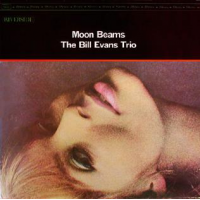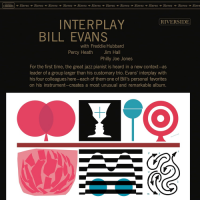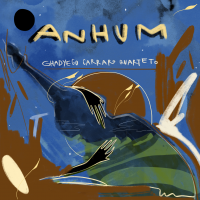 In April, May, June and July of 1962, pianist Bill Evans was ferociously busy in recording studios. Ten months earlier, his first working trio was at its peak, recording in exquisite form at New York's Village Vanguard. The three musicians had realized Evans's dream of playing conversationally—each member playing off the other two as equals rather than the piano taking the lead with the bass and drums merely playing supportive roles. At the Vanguard, the bassist was Scott LaFaro and the drummer was Paul Motian.
In April, May, June and July of 1962, pianist Bill Evans was ferociously busy in recording studios. Ten months earlier, his first working trio was at its peak, recording in exquisite form at New York's Village Vanguard. The three musicians had realized Evans's dream of playing conversationally—each member playing off the other two as equals rather than the piano taking the lead with the bass and drums merely playing supportive roles. At the Vanguard, the bassist was Scott LaFaro and the drummer was Paul Motian. Eleven days later, on July 6, LaFaro, was visiting his mother in upstate New York when he had a fatal auto accident. Evans was devastated. It was as if a musical spouse had perished. His love for LaFaro's playing was evident, and with the bassist's death, Evans's perfect trio was no more. As he slipped into a depression and his heroin addiction deepened, the pianist was determined to keep busy.
n April and May, Evans recorded Undercurrent for United Artists, the first of two duet albums with guitarist Jim Hall. In May and June, he recorded tracks for Moon Beams and How My Heart Sings, with bassist Chuck Israels and Motian on drums. Next came Interplay for Riverside in July, with Freddie Hubbard on trumpet, Hall on guitar, Percy Heath on bass and Philly Joe Jones on drums. In August, he recorded both Empathy for Verve with Monty Budwig on bass and Shelly Manne on drums and tracks for what would be Loose Blues, an album released posthumously in 1983, with tenor saxophonist Zoot Sims, guitarist Hall, bassist Ron Carter and Jones on drums.
Now Craft Recordings has just remastered and reissued Moon Beams and Interplay on 180-gram vinyl. As bassist Chuck Israels told me in 2019 about the album:
“Between May and June 1962, we recorded two albums over three sessions—Moon Beams and How My Heart Sings! The reason they were done this way is so that Riverside producer Orrin Keepnews didn’t wind up with all ballads with the same sedentary feel.
“By mixing up the songs during the three recording sessions, Orrin was able to segregate all the ballads for Moon Beams and use a wider variety of material for How My Heart Sings! Orrin told me the two-album sessions weren’t about Bill needing cash for heroin, as many people later thought, but to get two albums out of Bill with two different moods."
I've always felt that Moon Beams was on par with the Village Vanguard sessions of June 1961 in terms of grace, mood and interchanges. Loaded with ballads, there's a melancholy, introspective feel about the album, like the stillness before a thunderstorm.
 Interplay is a fascinating album in its own right. The selection of these specific artists by Keepnews was ingenious. After Evans's work with Miles Davis in 1958 and '59, I can't think of another album other than this one that pairs Evans with a trumpeter. Hubbard's articulation bounces hot off Evans's piano, compelling the pianist to play more brightly. Hall is the binding element that cements Evans and Hubbard.
Interplay is a fascinating album in its own right. The selection of these specific artists by Keepnews was ingenious. After Evans's work with Miles Davis in 1958 and '59, I can't think of another album other than this one that pairs Evans with a trumpeter. Hubbard's articulation bounces hot off Evans's piano, compelling the pianist to play more brightly. Hall is the binding element that cements Evans and Hubbard. Listening back to the album now on vinyl, there are so many precious moments. In particular, the spirited I'll Never Smile Again, with Hubbard using a mute, evoking Davis, and Evans comping as he did on the Miles Davis Sextet recordings. The inclusion of Philly Joe Jones, Davis's drummer, ensures a provocative ride.
Both recordings are smartly remamstered by Kevin Gray at Coherent Audio to give them a rich width and depth.
JazzWax tracks: You'll find Moon Beams and Interplay on vinyl (Craft Recordings) here and here.
JazzWax clips: Here's If You Could See Me Now from Moon Beams on Craft Recordings...
And here's I'll Never Smile Again from Interplay...
This story appears courtesy of JazzWax by Marc Myers.
Copyright © 2026. All rights reserved.


























